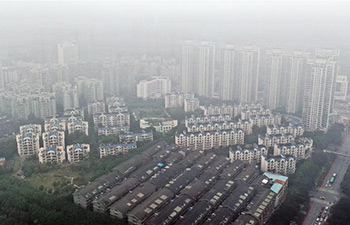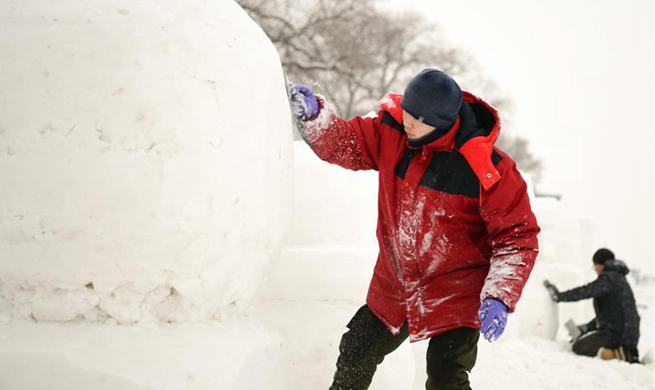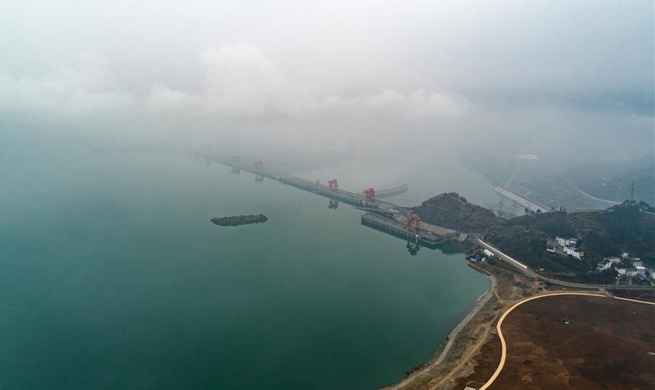URUMQI, Dec. 22 (Xinhua) -- When asked where he lives, 47-year-old Tajik herder Dure Jarman no longer points to the Karakoram Mountains and says, "There, in the mountains."
Instead, he has started to realize that it is necessary to memorize an address -- No. 224, Weiqi Road, the New Village of Tatkul. This is his new home, just 25 kilometers from the bustling county center.
Dure was born in the 2,000-meter high village of Aktogar Langgar, located deep in the remote Karakoram Mountains, northwest China's Xinjiang Uygur Autonomous Region. The village had been home to his family, along with 75 others, for many generations.
Meaning "black gravel", Karakoram is sparsely populated due to its altitude and ruggedness, with harsh natural conditions trapping the reclusive mountain dwellers in extreme poverty.
Dure's old home was transformed from a mud and stone hut sandwiched between two peaks into a brick house ten years ago, with help from the local government. In front of his door runs the roaring Datong River, and an almost vertical peak shadows the precarious dwelling.
Mountain dwellers have endured no electricity, tap water or means of communication for decades upon decades. Every day, Dure's family would have only two hours of sunlight to generate power with a solar panel, and would have to fetch water from the neighboring river. They also would have to keep an eye out for any tumbling rocks from the towering mountain peaks above.
There is only a muddy road connecting the villagers' committee office to the township government office 13 kilometers away. An experienced driver has to drive an off-road vehicle for an hour to get there, while houses scattered along the valleys of the Karakoram Mountains have made it even harder for infrastructure construction to take off. But this arduous lifestyle is about to come to an end.
After generations of eking an existence, 358 families in Taxkorgan Tajik Autonomous County, the westernmost county in China, recently decided to begin leaving the mountains to relocate to a resettlement village near the county center provided for free by the local government.
For poor people living in inaccessible, uninhabitable and dangerous areas, the solution is resettlement. China has been launching resettlement projects across the country in recent years, as part of its solid efforts to eradicate extreme poverty by 2020.
According to UN statistics, China has lifted over 700 million people out of poverty and contributed more than 70 percent to global poverty reduction.
For Dure, leaving his old home has been a difficult decision. "I grew up in the mountains. Our parents had always lived here. So had our cattle and sheep," he said.
He and his wife first visited the resettlement area in April, but they didn't claim their key to an 80-square-meter apartment until November. After feeling anxious for months, he finally felt calm about the big decision and started packing his family's belongings for their new but humble abode.
There is a 250-kilometer distance between Dure's two homes, so on official moving day, he had to get up early in the morning to load all the luggage onto his camel. Dure and his camel walked along the Datong River's bumpy and dry riverbed for around an hour to reach the villagers' committee office. With the help of township government officials, villagers loaded their belongings onto a truck that took them to the new resettlement area.
With patchy phone signal directing the truck through the mountain roads, an official resorted to standing on a peak to receive and send information, while relying on messages via a walkie-talkie.
When the truck finally reached a recently-paved highway, Dure could relax and soon started chatting with other villagers.
"In the past, it would take people three days to reach the county center by horse. They had to carry enough food with them," said Dure. "Before this highway was built, it took me six or seven hours to get there by car."
When the official relocation day was put on the schedule, Dure's wife Nanik Kukani spent a week making 12 quilts. "The quilts are for guests. We will buy our new pots and pans in the county," said Dure on the eve of moving day.
But when Dure arrived at his new home later that day, he found out he didn't need to buy any pots and pans, as his new home was already fully equipped -- a washing machine, a gas stove, an electronic cooker and other home appliances, all sponsored by local enterprises. The staff at the resettlement village had also got heater, beds and curtains ready.
At this sight, Dure was too happy to utter a word. He looked around the apartment in awe, felt the heat from radiators, opened the power distribution cabinet, and opened the curtains. Outside the new village is a 100-square-meter modern enclosure for his family's flock.
The local government has ensured that each herder family has access to newly-cultivated farmland and grassland. A factory will also soon open to women villagers to provide them with handicraft training courses and economic empowerment.
"Nanik can go to work in the factory. We can also open a shop when the market's construction is completed," said Dure.
Once Dure had moved all the family's belongings into the new home, he went back to the old house for Nanik, who had been looking after his 85-year-old mother and their flock during relocation.
Dure's 16-year-old daughter Gulizba Sultanbek was the happiest about moving. Attending the county's middle school, she was never able to go home every afternoon, as a single trip from the old house in the mountains costs 200 yuan (29 U.S. dollars). As such, she would stay in student dorms and only come home during the summer and winter holidays, leaving her with great sadness in the absence of her beloved family.
But with the new home being closer to the school, she can now come back home more often. One day she volunteered to do all the cleaning, and even took photos with the neighbors with a big smile.
While Dure had never thought of leaving the mountains over the past four decades, and it might take him a long time to truly bid farewell to Karakoram, his little brick house and his traditional way of living, Gulizba had been dreaming of this day for a long time.
"Living here is not much different from living in the county center," she said. "But that valley I used to live in, it freezes my heart."

















